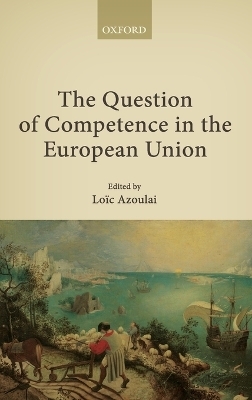
The Question of Competence in the European Union
Seiten
2014
Oxford University Press (Verlag)
978-0-19-870522-2 (ISBN)
Oxford University Press (Verlag)
978-0-19-870522-2 (ISBN)
The allocation of powers between the European Union and its Member States is a classic theme in European studies. The question of to how to limit the expansion of Union's competences whilst safeguarding the dynamics of the process of European integration is now being raised. This book is a theoretical and practical inquiry into this question
The classic debate surrounding the prolific role of the European Union in defining spheres of competence and power relationships has long divided scholarly opinion. However, in recent years, the long-standing acquiescence to the broad powers of the Union has given way to the emerging perception of a competence problem in Europe. For a long period it was taken for granted that the European Community could act whenever its action was justified on the basis of the widely interpreted objectives of the Treaties. However this context has since changed. There is a widespread perception of a competence problem in Europe and the overabundance of provisions limiting the Union's competences is one of the most obvious marks left by the Lisbon Treaty.
This book discusses the extent to which the parameters of power throughout the Union and its Member States have been recast by the recent implementation of the Lisbon Treaty and doctrines developed by the European Court of Justice. Comprised of contributions from a vast array of leading practitioners and academics in the field of EU Law, this volume assesses the debate surrounding the political identity of the European Union, and further illustrates the relevance of the Federal theory of sharing competences for the development of EU Law. Finally, the question of new potential limits to Union's competence is addressed. If anything, this broad reflection on the notion of competence in the EU law context is a way of opening up the question of the nature and contours of the political identity of the European Union.
The classic debate surrounding the prolific role of the European Union in defining spheres of competence and power relationships has long divided scholarly opinion. However, in recent years, the long-standing acquiescence to the broad powers of the Union has given way to the emerging perception of a competence problem in Europe. For a long period it was taken for granted that the European Community could act whenever its action was justified on the basis of the widely interpreted objectives of the Treaties. However this context has since changed. There is a widespread perception of a competence problem in Europe and the overabundance of provisions limiting the Union's competences is one of the most obvious marks left by the Lisbon Treaty.
This book discusses the extent to which the parameters of power throughout the Union and its Member States have been recast by the recent implementation of the Lisbon Treaty and doctrines developed by the European Court of Justice. Comprised of contributions from a vast array of leading practitioners and academics in the field of EU Law, this volume assesses the debate surrounding the political identity of the European Union, and further illustrates the relevance of the Federal theory of sharing competences for the development of EU Law. Finally, the question of new potential limits to Union's competence is addressed. If anything, this broad reflection on the notion of competence in the EU law context is a way of opening up the question of the nature and contours of the political identity of the European Union.
Loïc Azoulai holds the chair of European Law at the European University Institute. He is codirector of the Academy of European Law and of the Centre for Judicial Cooperation both hosted at the European University Institute. He is on leave from University of Panthéon-Assas Paris II where he is a Professor of Public Law. He has published on a wide range of questions related to European Union Law.
PART I: THE REFERENCE TO FEDERALISM; PART II: THE ALLOCATION OF COMPETENCES IN EU PRACTICE; PART. III: THE ECJ AND THE QUESTION OF COMPETENCE; PART. IV: POLITICAL AND LEGAL LIMITS TO EU COMPETENCES
| Erscheint lt. Verlag | 6.3.2014 |
|---|---|
| Verlagsort | Oxford |
| Sprache | englisch |
| Maße | 162 x 239 mm |
| Gewicht | 618 g |
| Themenwelt | Recht / Steuern ► EU / Internationales Recht |
| Recht / Steuern ► Öffentliches Recht ► Völkerrecht | |
| Sozialwissenschaften ► Politik / Verwaltung ► Europäische / Internationale Politik | |
| ISBN-10 | 0-19-870522-0 / 0198705220 |
| ISBN-13 | 978-0-19-870522-2 / 9780198705222 |
| Zustand | Neuware |
| Informationen gemäß Produktsicherheitsverordnung (GPSR) | |
| Haben Sie eine Frage zum Produkt? |
Mehr entdecken
aus dem Bereich
aus dem Bereich


